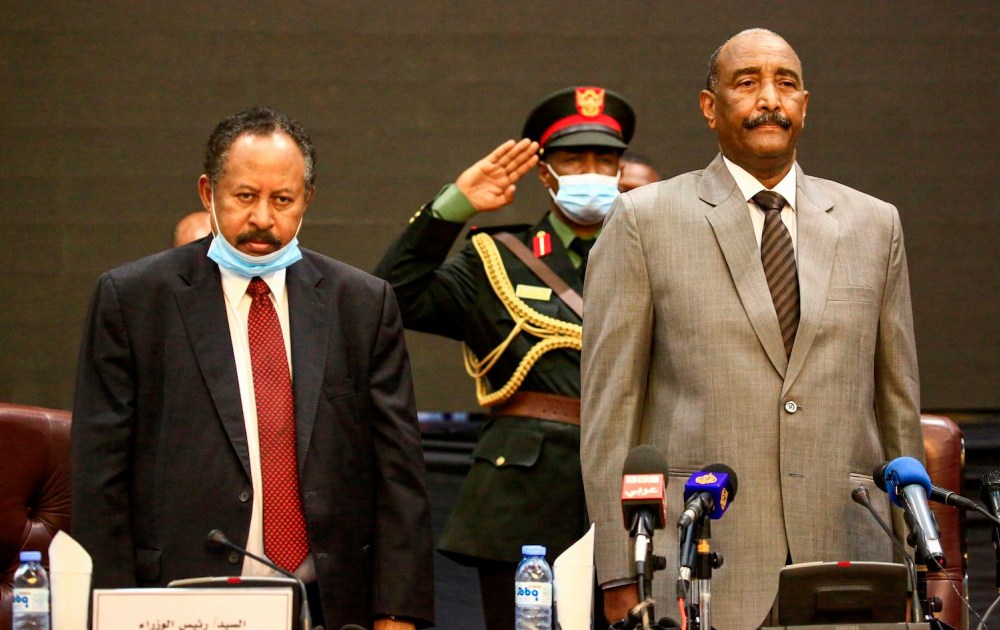A statement by the Sudanese Presidential Palace stated that the Commander-in-Chief of the Sudanese Army, Abdel Fattah Al-Burhan, agreed with US Secretary of State Anthony Blinken - in a phone call yesterday, Thursday - to expedite the formation of a government, amid indications of an imminent agreement between the Sudanese parties.
And a statement issued after Blinken contacted Al-Burhan stated: "The two parties stressed the need to preserve the path of the democratic transition, and the need to complete the structures of the transitional government and expedite the formation of the government."
In a tweet on Twitter, Blinken called for the full and immediate restoration of the civilian-led transitional government and institutions in Sudan.
The United States stands with our UK, Saudi, and Emirati partners and voice our support for the democratic aspirations of the Sudanese people.
We call for the full and immediate restoration of its civilian-led transitional government and institutions.
— Secretary Antony Blinken (@SecBlinken) November 4, 2021
Outline of a future agreement
In parallel, Reuters reported that the head of the United Nations Mission in Sudan, Volker Peretz, revealed consensus on broad lines for a possible agreement between the Sudanese parties.
The UN envoy added that the agreement allows for power-sharing between the military and civilians, including the return of the ousted Prime Minister, Abdullah Hamdok, to his post.
The potential agreement also includes the formation of a technocratic government, amendments to the constitutional document, the lifting of the state of emergency, and the release of detainees.
Volcker stressed the need to reach that agreement within days, not weeks, before the two sides harden their positions, he said.
Tut Galwak, the security advisor to the President of the State of South Sudan and head of the South Sudanese mediation team, had said earlier on Thursday that he had arranged a meeting between Al-Burhan and Hamdok to discuss the developments of the Sudanese crisis.
The South Sudanese envoy confirmed that Al-Burhan responded to the mediation, and that Hamdok is one of the candidates to form a new government in Sudan, but according to a new political vision.
And Sudan TV had said - yesterday, Thursday - that the army chief, Lieutenant-General Abdel Fattah Al-Burhan, decided to release 4 ministers in the isolated Hamdok government. According to the Messenger (communication), and Yusuf Adam (youth and sports).
New Institutions
On the other hand, a military source - who asked not to be named as he is not authorized to speak to the media - revealed that the new Sovereignty Council will consist of 5 people from the military component, 8 representatives of the regions of Sudan, as well as a female figure.
And he added, "The nominations have been approved by Al-Burhan to be officially announced in the coming hours," without specifying a specific time.
The source confirmed that there are 3 candidates for the position of Prime Minister, in the event that Abdullah Hamdouk does not agree to take over the presidency of the new transitional government, and they are: Ambassador Omar Dahab, human rights activist Mudawi Ibrahim, and Director of the International University of Africa Henod Abia.
The source pointed out that there is a (unspecified) time limit for local, regional and international mediation with Hamdok, to occupy the position of prime minister.
Al-Burhan had said in a meeting with the African Union envoy, Olison Abusango, on Wednesday, that they (the army) are in the process of appointing a prime minister who will form a civilian technocratic government.
Al-Burhan added that the army is keen to protect the democratic transition in the country, complete the structures of the transitional period, and lead to free and fair elections.
Demonstrations demanding a return to the democratic path
On Thursday, popular demonstrations took place in neighborhoods of the Sudanese capital, Khartoum, in protest against the decisions taken by the Sudanese army, and a call for the return of civilian rule.
The participants in these demonstrations - which took place in Al-Dim neighborhood in Khartoum, Al-Arbaeen Hospital in Omdurman, and Al-Safi neighborhood in Khartoum North - chanted against what they described as the military coup carried out by the army, and stressed the need for the ousted Prime Minister Abdullah Hamdok and his government to return to the practice of their tasks.
In turn, the Sudanese Professionals Association called on the Sudanese people to return to civil disobedience on Sunday and Monday, in order to protect the revolution.
The "Coordination of the Resistance Committees" used to organize these nightly demonstrations inside the neighborhoods, in preparation for larger marches in the three cities of the capital (Khartoum, Bahri and Omdurman).
For more than a week, Sudan has witnessed protests rejecting what the opposition considers a "military coup", as a result of the army's declaration on October 25 of a state of emergency, the dissolution of the Sovereignty Council and the transitional ministers, the dismissal of governors, the arrest of party leaders, ministers and officials, and the status of Prime Minister Abdullah Hamdok is under house arrest.

